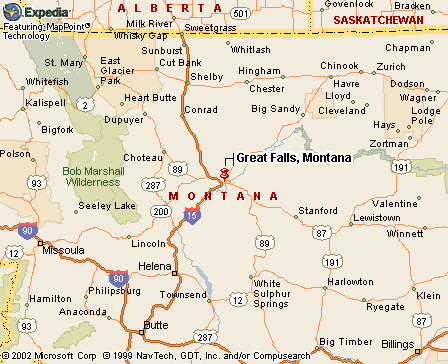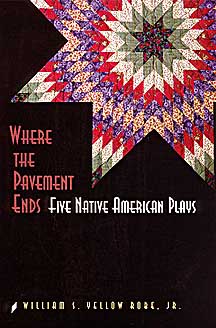|
|
Canku Ota |
|
|
(Many Paths) |
||
|
An Online Newsletter Celebrating Native America |
||
|
April 20, 2002 - Issue 59 |
||
|
|
||
|
Teacher Urges Schools to Spread Art to American Indian Students |
||
|
by Kim Skornogoski
Great Falls Tribune
Staff Writer
|
||
|
|
|
Since those early days, the demand has grown for plays written by Indians, addressing Indian issues, featuring Indian actors. "The communities are so hungry for it," he said Sunday. "Native people want to see their lives reflected (on stage) and non-Natives want learn about another culture." Playwriting is an extension of traditional storytelling -- a way to teach a lesson or pass along family tales. Yellow Robe asked educators to push their students to write, act, paint or sculpt to incorporate storytelling and Indian culture into the classroom. The faculty affiliate at the University of Montana's English department was one of many presenters at the Montana-Wyoming Indian Education Association conference being held at the Heritage Inn Sunday and today. Organizers estimated 275 people attended the 20th annual conference to learn how to infuse educational programs with Indian history and culture and to talk about contemporary issues facing the state's schools. In teaching at schools across the country, Yellow Robe found when he asked them to write their own plays, students naturally incorporated their language, music and culture into their stories. "You get a sense when a story is being told -- a sense of environment, of community," he said. Yellow Robe inherited his storytelling skills from his grandmother, who told him old tales of the coyote and new tales of uncles and cousins that lived far away from the Fort Peck Indian reservation where he was raised. Each story had characters and a purpose besides entertainment, he said, but unlike his plays, they were never written down. Students should be encouraged to write not only what they know, but about things and issues that are close to their heart, Yellow Robe said. Their passion will help bring the stories to life. Yellow Robe has examined many topics in his own plays, including a drama about his own addiction to alcohol. At the Indian education conference, the No Borders Indigenous Theater Company cracked up the crowd, performing his play "Better-n-Indians." The production is a series of vignettes taking a comedic look at ways Indian culture is cheapened. One skit pokes fun at a young man at a powwow whose fancy dance outfit is filled with lights, mirrors and metal. Thanks to a girl he's trying to snag, the young man, whose intentions were to be different, learns the bells and whistles aren't necessary. At one point, the narrator says, "It's now 6 p.m., and the following people are still Native:" At other times the narrator teasingly encourages the audience to buy Indian artifacts and replicas of treaties in the lobby. Yellow Robe started the No Borders theater group to create an outlet for Indian playwrights and actors. As many as 29 people are involved with a production at a time. All plays are written by Indians, many of whom are within the company and have never written more than a thesis for class. The concept can be done at no cost in any community, Yellow Robe told the teachers, and is a great creative outlet for Indian students. Another vignette in Yellow Robe's play is about a woman named Ellen Jones who has changed her name to Wandering Rain Drop on a Slow Moving Leaf in the Wind to get in touch with her Indian side. The actress, Flo Gardipee, has begun writing poetry and hopes to eventually write a scene or play for the company. "(The stories) come from our viewpoint and the scenes are acted considering our backgrounds and our memories as Native people," she said. "This is a good tool to present our outlooks to people." Before each performance, the company members pray and are smudged, a brief ceremony that involves lighting a small fire of native grasses. Emily Ferguson-Steger hopes to work her acting experiences with the troupe into the classroom when she graduates from UM in a year. "It's important to natives to show them culture is worth writing down and sharing," she said. "Write or read; even if it's not a full play, it's important to do." |
|
|

|
www.expedia.com |
|
|
||
|
|
||
| Canku Ota is a free Newsletter celebrating Native America, its traditions and accomplishments . We do not provide subscriber or visitor names to anyone. Some articles presented in Canku Ota may contain copyright material. We have received appropriate permissions for republishing any articles. Material appearing here is distributed without profit or monetary gain to those who have expressed an interest. This is in accordance with Title 17 U.S.C. Section 107. | ||
|
Canku Ota is a copyright © 2000, 2001, 2002, 2003 of Vicki Lockard and Paul Barry. |
||
 |
 |
|
|
The "Canku Ota - A Newsletter Celebrating Native America" web site and its design is the |
||
|
Copyright © 1999, 2000, 2001, 2002, 2003 of Paul C. Barry. |
||
|
All Rights Reserved. |
||
 William
Yellow Robe began writing plays because as an actor, there were
no parts written for Indians. He then struggled to find enough Indian
actors to fill the roles he had written.
William
Yellow Robe began writing plays because as an actor, there were
no parts written for Indians. He then struggled to find enough Indian
actors to fill the roles he had written.